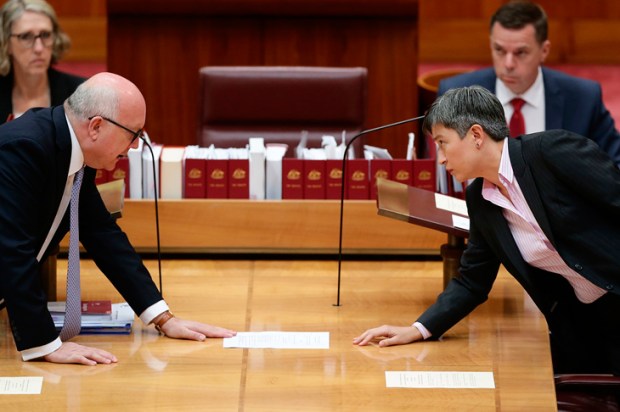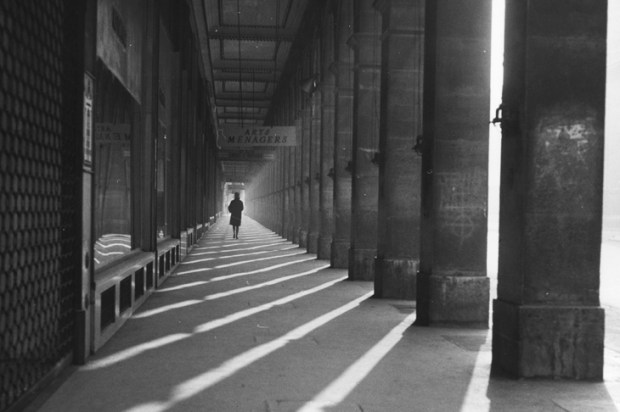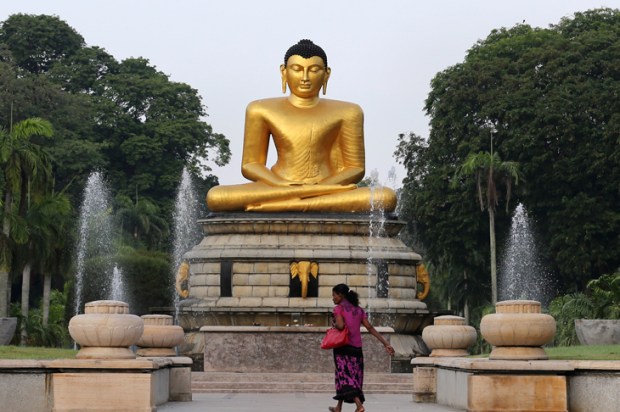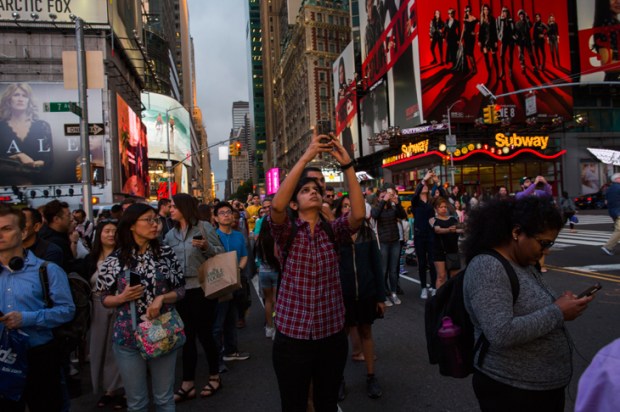What a long Parliamentary year it has been. But at last, as the Senate clock approaches midnight on the last sitting day, the President, Stephen Parry, utters the welcome words ‘The Senate stands adjourned’. The last sittings of the year have been typically full-on, as Ministers negotiate with cross benchers to get their legislation through. There is certainly a new spirit of co-operation in the chamber; in the final fortnight, we pass 19 important Bills, with the support, variously, of Labor, of different combinations of crossbench Senators and, on one notable occasion – much to the fury of the ALP – of the Greens. Purists may criticise but, as any aficionado of Robert Caro well knows, the art of legislation is compromise, and constructing majorities is the core skill of democratic politics.
The week after Parliament adjourns, I travel to the UK and the Middle East for talks with security chiefs and counterpart Ministers. My first appointment is with Theresa May, the formidable British Home Secretary, leader of the Tory Right and potential successor to David Cameron. We meet in her House of Commons office to compare notes about our countries’ respective approaches to countering extremism. The Palace of Westminster is a neo-Gothic extravaganza; a maze of corridors, unlikely staircases and odd angles. The Home Secretary’s office, beneath Big Ben, has the comfortable, cluttered feel of an Oxford don’s tutorial room. Plenty of bookcases. The following day, Julie Bishop, Alexander Downer and I go to MI6 for a briefing with the Chief of the Secret Intelligence Service. This is at the building depicted to such spectacular effect in the recent Bond film. ‘C’ (yes, he really is referred to as ‘C’) is an utterly charming Old Etonian. After a long and granular discussion about strategies to deal with global terrorism, we are offered tea. I notice that our host takes his from a ceramic mug with ‘C’ emblazoned on the side. In green, of course. There is no other city in the world quite like London to feel the spirit of Christmastime. Sadly, Christian symbols have been removed from most of the public decorations – theologically-neutral snowflakes and trees are the preferred shapes. Still, Regent St and Piccadilly are a riot of coloured lights and busy shoppers. I take myself to St Margaret’s Westminster for a carol service. No shortage of Christian symbols here; it is as traditional a Christmas service as one could hope to find. Popular actors, including Dame Penelope Keith, do the readings. The congregation is well-to-do and respectable: the Conservative Party at prayer, indeed.
The next day, to Israel. The highlight of the visit is the meeting which Christopher Pyne and I have with Benjamin Netanyahu. We are told that the meeting cannot go for more than 30 minutes. In fact, the Prime Minister lets the conversation flow; we are with him for the best part of an hour. It is my first conversation with Netanyahu. He is relaxed and – despite his wafer-thin Knesset majority – seems in complete command. I had expected to find him a little intimidating, but he is genial and charming. He is an extraordinarily intelligent, deeply-read man, whose conversation transcends everyday politics to draw upon a profound sense of history. From the youngish man who first captured the world’s attention in the 1990s, Netanyahu, now Israel’s second-longest serving PM, has settled into the appearance and manner of the wise elder statesman. And at this point in history, while he sees chaos in the Arab world around him, he presides over an Israel which seems, by comparison, a rock of stability in the Middle East. A visit to Jerusalem the fortnight before Christmas would not be complete without visiting the reputed birthplace of Jesus, in the crypt of the Church of the Holy Nativity in Bethlehem, which lies across the 1967 borders in Palestinian territory. It is ineffably moving to kneel at the altar-rail before the simple shrine, illuminated by three lanterns. Some years ago, particularly at Christmas, people queued for many hours merely to pass by. Now, as a result of the de-Christianisation of so much of the Middle East and the fear of terrorism, there are surprisingly few people to be seen.
The final leg of my journey takes me to Jordan. We drive across the Jordan Valley, through a landscape of lunar barrenness, to cross at the Allenby Gate. I spend the day with Jordanian intelligence chiefs and Ministerial counterparts. The following day, we make the journey, in a cavalcade of armoured vehicles, to the Syrian border. We look from the border post across an area of southern Syria which is held by the Free Syrian Army. It is contested territory; Russian warplanes bombed here a few nights earlier. At the border post is a mobile triage and surgical unit, which deals every day with victims of the conflict fleeing into Jordan. I tell our Jordanian host, the General commanding the 2nd Brigade Border Guard Command, of Australia’s commitment to resettle 12,000 Syrian refugees. He expresses thanks for the fact that Australia, unlike most nations, has offered to shoulder some of the burden.
On my return, I learn of the announcement by Senator Michael Ronaldson that he is bringing his long and significant Parliamentary career to a close. Ronno was first elected to the Reps in 1990, holding the difficult marginal seat of Ballarat for four elections, before retiring in 2001. In 2004, he decided to make a comeback as a Senator. He served in various key positions including Chief Government Whip, Special Minister of State, Minister for Veterans Affairs and Minister for the Centenary of Anzac. It can be said of few, when they leave Parliament after so many years, that they have earned both the respect and the affection of both sides of politics. But of Ronno, it undoubtedly can. Farewell, my friend.
Got something to add? Join the discussion and comment below.
Get 10 issues for just $10
Subscribe to The Spectator Australia today for the next 10 magazine issues, plus full online access, for just $10.












Comments
Don't miss out
Join the conversation with other Spectator Australia readers. Subscribe to leave a comment.
SUBSCRIBEAlready a subscriber? Log in